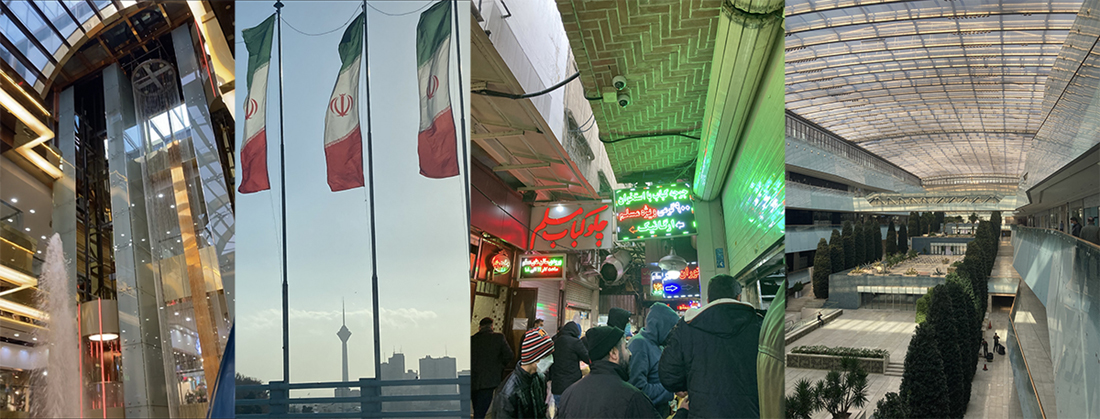Opinion: Americans’ inaccurate assumptions about Iran perpetuate harmful stereotypes

In the United States, prejudice against Iranians and their homeland is widespread. Having spent time in both nations, columnist Omid Rahimdel has witnessed these misconceptions firsthand and discusses both their historical origins and the harms they have caused.(Courtesy of Omid Rahimdel)
By Omid Rahimdel
April 20, 2022 9:25 p.m.
As Mark Twain once said, “The trouble with the world is not that people know too little; it’s that they know so many things that just aren’t so.”
I learned that Twain’s musings hold true to this day when I visited Iran last winter. After years without seeing my family there, I finally had a chance to return.
More than anything I encountered during the trip, the misconceptions of Iran I had witnessed in the United States stood out to me.
These misconceptions are largely based on the historical relationship between the U.S. and Iran. Prior to 1979, the countries had positive relations under Mohammad Reza Shah Pahlavi’s government. However, this relationship deteriorated after the Iran hostage crisis and the Iranian Revolution of 1979 that overthrew the Shah because it was believed that he was a “puppet” of the U.S. Recently, tensions rose once again after a U.S. drone strike killed Iranian general Qassem Soleimani in 2020.
This negative relationship has often led to inaccurate portrayals of Iran in the U.S. in popular media. Movies such as Argo, for example, portray Iranians as aggressive and violent, which are harmful stereotypes. Middle Eastern characters in American films and media are also often typecast as terrorists. Not to mention, Iran and other Middle Eastern countries are generalized as if they are all the same. These factors, combined with the tense relationship between the American and Iranian governments, have likely contributed to many inaccurate perceptions of Iran that have become commonplace in the U.S.
However, these are merely misconceptions, a truth that becomes apparent once one gets to learn more about Iran for themselves.
“There is a lack of geographical information and knowledge about Iran and its history that creates misconceptions and prejudice,” said Latifeh Hagigi, a senior lecturer in the department of Near Eastern languages and cultures.
She went on to explain that if people are able to travel to Iran and have that experience, they may have a change of attitude and become more tolerant and accepting.
This change is important because misconceptions about Iran are harmful to the Iranian American community.
Shideh Zokaiy, a fourth-year sociology student, came to the U.S. in 2009 at the age of 10.
“When people asked me where I was from or what my ethnicity was, I would not say I was Iranian,” Zokaiy said. “I would say I was Asian because Iran is in Asia and I knew there were negative feelings in America towards Iran.”
One common misconception is that Iran is dangerous. Multiple people told me to “be careful” when they learned I was going there. While Iran is not free of injustices or corruption, this sentiment is not representative. Strangers treated me like an old friend and comfortably voiced their opinions about various political topics. In fact, many Iranian cultural traditions are based around politeness.
These ideas don’t just affect us when we are going to Iran; they can lead to danger and discrimination for Iranians in the United States.
“I would hear many ‘terrorist’ jokes towards Iranians and I did not want to be othered so I would just laugh it off, and it became desensitized for me,” Zokaiy said. “A woman in my new neighborhood once called the police on my grandmother because she viewed my grandmother as a threat to her life because she was wearing a head covering.”
Another popular misconception is that all Iranians hate Americans. There was a teacher in my high school who said he wore clothing with a Canadian rather than American flag while in Iran for safety reasons. After visiting, I believe this was an inaccurate and exaggerated concern. Iranian people were generally excited when they heard I was from America and were curious about what America was like. A teacher I knew in Iran summed this attitude up well when he said, “These issues are more between governments, not people.”
A third misbelief is that Iran is not a developed country. A friend saw a picture of Iran I had posted that showed a lot of greenery, and he said he thought Iran was just a big desert. On the contrary, Iran is diverse, with large, technologically advanced cities. Many of these cities have the same advancements as a major American city.
There were even some technologies in Iran that I have not yet seen in America. For example, if you go over the speed limit in certain tunnels, you receive a text notifying you that you have a speeding ticket.
“I took a computer class in elementary school, and my classmates described how they thought Iran did not have any computers,” said Kimia Karaminejad Ranjbar, a third-year economics student.
Ranjbar was born in Iran and came to the U.S. in 2009. In recent years, she has used TikTok to help show non-Iranians what the country is truly like. She now has more than 126,000 followers.
While Iran is a prime example of how misconceptions of other countries exist in the U.S., misconceptions of this nature certainly are not limited to Iran. Misconceptions of various countries and cultures are common in the U.S., and many Americans have misconceptions about the U.S. as well.
It is important to be aware of these misconstrued beliefs because they impact the lives of many people across the nation and in our very own UCLA community.


